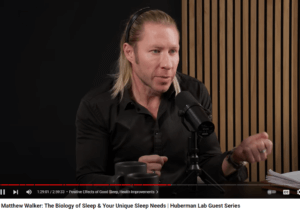
Dr. David Sinclair: The Biology of Slowing & Reversing Aging | Huberman Lab Podcast #52
The biology of aging, a complex interplay of cellular processes, holds the key to understanding how we can slow or potentially reverse the effects of time on our bodies. In this blog, we delve into a conversation between Dr. Andrew Huberman, a neurobiologist and ophthalmologist at Stanford, and Dr. David Sinclair, a genetics professor and co-director of the Paul F. Glenn Center for Biology of Aging at Harvard. Their insights offer profound implications on aging, longevity, and the mechanisms that underlie them.
The Revolutionary View on Aging
Dr. Sinclair introduces a transformative perspective on aging, arguing that it should be treated as a disease rather than an inevitable consequence of life:
“Aging is not the normal and natural consequence that we all will suffer. But rather that aging is a disease that can be slowed or halted.”
This statement challenges traditional notions and emphasizes aging as a significant factor behind many diseases rather than just a byproduct of time. Sinclair’s research suggests that interventions can indeed alter the aging process, potentially reversing age-related diseases by rejuvenating the body at a cellular level.
Epigenetics and Aging
A critical part of their discussion centers on the epigenome, a key player in cellular aging. Dr. Sinclair explains:
“Aging is the equivalent of scratching the CD and the DVD so that you, you’re not playing the right songs and cells when they don’t hear the right songs, they get messed up and they don’t function well.”
The epigenome regulates gene expression, and as we age, this regulation falters, leading to diseases. Sinclair’s analogy to a scratched CD not playing the right music conveys how aging cells lose their functional identity, contributing to the systemic decline associated with old age.
Deep Dive: The Role of Sirtuins in Aging
Central to Sinclair’s research are the sirtuins, a family of proteins that play a crucial role in aging. Sirtuins influence the epigenome by maintaining the stability and health of our DNA. These proteins can be activated by lifestyle choices such as diet and exercise, and also through nutritional supplements like NMN and resveratrol, which enhance the body’s natural defense mechanisms against aging.
The activation of sirtuins essentially allows cells to maintain their youthful function longer, delaying the aging process and associated diseases. By adjusting our lifestyle and perhaps incorporating specific supplements, we can potentially activate these pathways more frequently, mirroring the effects of caloric restriction without needing to alter our diet drastically.
Nutritional Interventions: Impact on Longevity
Both Huberman and Sinclair also touch upon the importance of nutritional interventions in modulating the aging process:
“What we actually found, my colleagues and I, across this field of longevity is that… the ones that live the longest by far 30% longer and stay healthy are the ones that don’t eat all the time.”
This discussion points towards intermittent fasting and reduced caloric intake as potent tools to enhance lifespan and healthspan. The mechanism involves less frequent activation of pathways like mTOR and insulin-like growth factor, which in turn stimulates protective pathways including those governed by sirtuins.
Conclusion: Rethinking Aging
The conversation between Dr. Huberman and Dr. Sinclair provides us with a groundbreaking look at how we perceive and can potentially manipulate the aging process. By redefining aging as a controllable factor rather than an inevitable decline, we open new avenues for research and interventions that could lead not just to longer lives, but to healthier lifespans as well.





